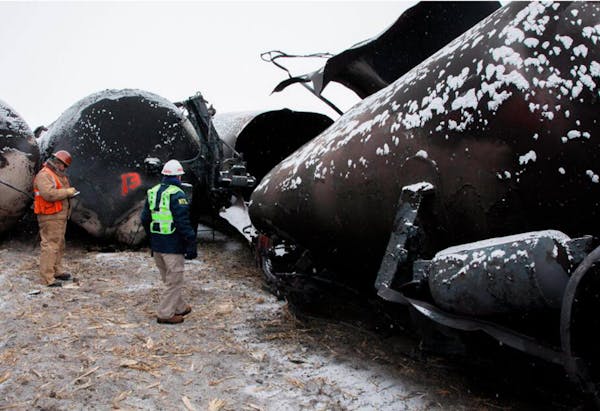Federal rail inspectors have cited BNSF Railway Co. in North Dakota for 721 track violations, finding problems serious enough to threaten fines in one out of every five inspections since 2006, according to federal data released Wednesday.
Federal Railroad Administrator Joseph Szabo said in a letter to a North Dakota senator that federal officials conducted 3,822 inspections during the period and found 13,141 defects, the vast majority of which were addressed without fines.
However, in 721 instances, or 19 percent of the inspections, officials determined that BNSF violated railroad regulations. That happens when a problem isn't fixed or is serious enough to warrant a violation right away. Szabo's letter, released by Sen. Heidi Heitkamp, D-N.D., didn't describe the violations, the track conditions that produced them or say how much BNSF paid in fines.
Heitkamp asked for the information after a BNSF oil train crashed a mile outside Casselton, N.D., on Dec. 30, producing explosions, a massive fire and temporary evacuation of much of the town, though no one was hurt. It was one of approximately 10 oil trains that depart daily from the Bakken oil fields, most of which run on BNSF tracks that lead into Minnesota.
In the letter, Szabo said the Federal Railroad Administration (FRA) has an ongoing investigation and safety assessment of the BNSF rail line in Cass County, where the accident occurred. He said four derailments have occurred on the line over nine years, two of which were track-related — a misalignment near Casselton in 2005 and a broken rail near Page, N.D., in 2008. The others, he said were equipment-related.
But Szabo's letter offered no comparison of BNSF's North Dakota problems to those of other railroads. FRA annual enforcement reports also don't offer comparable track-related violations, and an agency spokesman was unable to provide the information Wednesday. In 2013, BNSF was assessed $2.3 million in fines across the nation, according to the FRA's report.
BNSF, which responded to the letter and reporters' questions by e-mail Wednesday, said derailments on mainlines hit record lows last year, and that busy routes are inspected twice as frequently as the FRA requires. In North Dakota last year, the company said, it replaced 415,000 ties and 300 miles of rail and will make a record investment this year to maintain and expand capacity in the state.
BNSF spokeswoman Amy McBeth said defects detected by FRA and BNSF can include ties, rail anchors, the rock ballast around ties, switches, loose bolts and cracked bars. Many problems are immediately repaired or speed restrictions are imposed until repairs are made, she said. FRA audits over the past seven years found less than one defect per mile on BNSF's 2,300 miles of North Dakota track, she added.
Heitkamp said it's clear that the Casselton area, 20 miles west of Fargo, needs increased attention considering the number of derailments there.
"Folks who live near these tracks have been through a lot, and deserve to know that the rails are under close examination and that FRA is doing everything to make sure North Dakotans aren't at risk," she said in a statement.
The National Transportation Safety Board is investigating the Dec. 30 accident, but has not determined the cause. A broken axle was found near the crash, which happened after a westbound soybean train derailed on a parallel track. The oil train, which was headed for Minnesota, crashed into a grain car that had landed on the eastbound track.
Inspection vehicle
In July, the letter said, the FRA ran an automated track inspection vehicle from Dilworth, Minn., to Mandan, N.D., and discovered 11 problems over 202 miles. Another such inspection is planned later this year, the letter added.
Larry Mann, a rail safety attorney based in Washington, D.C., said in an interview that FRA's disclosure that it conducted just one automated inspection on the BNSF line in 2013, with one planned in 2014, illustrates the weakness in federal oversight.
"They should do it frequently," Mann said of the automated inspections, which examine whether tracks' distance apart, alignment and other parameters meet specifications. "That is what causes derailments."
Mann also said that violations carry such low penalties that they don't serve as deterrents.
Heitkamp and others in Congress and in the Minnesota Legislature have called for hearings on rail safety in light of recent oil train accidents.
Trains with 100 or more tank cars carry away about 70 percent of North Dakota's nearly 1 million barrels of daily crude oil production. Most oil trains go through Minnesota, with six a day, on average, passing through the Twin Cities, according to the Minnesota Department of Transportation.
David Shaffer • 612-673-7090 • Twitter: @ShafferStrib
Tennessee Volkswagen workers vote on union membership in test of UAW's plan to expand its ranks
Here's how Phish is using the Sphere's technology to give fans something completely different

